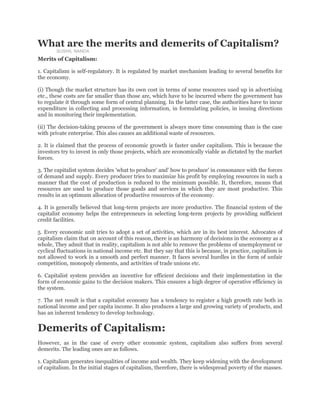
Merits and Demerits of Capitalism: Self-Regulation vs Inequality
- 1. What are the merits and demerits of Capitalism? SUSHIL NANDA Merits of Capitalism: 1. Capitalism is self-regulatory. It is regulated by market mechanism leading to several benefits for the economy. (i) Though the market structure has its own cost in terms of some resources used up in advertising etc., these costs are far smaller than those are, which have to be incurred where the government has to regulate it through some form of central planning. In the latter case, the authorities have to incur expenditure in collecting and processing information, in formulating policies, in issuing directions and in monitoring their implementation. (ii) The decision-taking process of the government is always more time consuming than is the case with private enterprise. This also causes an additional waste of resources. 2. It is claimed that the process of economic growth is faster under capitalism. This is because the investors try to invest in only those projects, which are economically viable as dictated by the market forces. 3. The capitalist system decides 'what to produce' and' how to produce' in consonance with the forces of demand and supply. Every producer tries to maximize his profit by employing resources in such a manner that the cost of production is reduced to the minimum possible. It, therefore, means that resources are used to produce those goods and services in which they are most productive. This results in an optimum allocation of productive resources of the economy. 4. It is generally believed that long-term projects are more productive. The financial system of the capitalist economy helps the entrepreneurs in selecting long-term projects by providing sufficient credit facilities. 5. Every economic unit tries to adopt a set of activities, which are in its best interest. Advocates of capitalism claim that on account of this reason, there is an harmony of decisions in the economy as a whole, They admit that in reality, capitalism is not able to remove the problems of unemployment or cyclical fluctuations in national income etc. But they say that this is because, in practice, capitalism is not allowed to work in a smooth and perfect manner. It faces several hurdles in the form of unfair competition, monopoly elements, and activities of trade unions etc. 6. Capitalist system provides an incentive for efficient decisions and their implementation in the form of economic gains to the decision makers. This ensures a high degree of operative efficiency in the system. 7. The net result is that a capitalist economy has a tendency to register a high growth rate both in national income and per capita income. It also produces a large and growing variety of products, and has an inherent tendency to develop technology. Demerits of Capitalism: However, as in the case of every other economic system, capitalism also suffers from several demerits. The leading ones are as follows. 1. Capitalism generates inequalities of income and wealth. They keep widening with the development of capitalism. In the initial stages of capitalism, therefore, there is widespread poverty of the masses.
- 2. In later stages, the poverty is not acute in absolute terms, but inequalities remain. Some economists are of the view that inequalities reduce aggregate economic welfare of the society as a whole. 2. The inequalities of income and wealth, together with the institution of inheritance, leads to wide differences in economic opportunities. Those with more wealth and capital are able to get better education and training. They are also able to get better employment, or they can manage the businesses inherited by them. As a result, some members of the society start their career with higher income simple because of inheritance. 3. The composition of production in capitalism follows the pattern of demand. However on account of inequalities, the pattern of demand does not represent real needs the society. The result is a distortion in the production pattern also. 4. It is maintained by critics that capitalism wastes its productive resources in several ways. We can give the example of large-scale advertisement and other forms of selling expenses. To a large extent, the expenses incurred by one firm get neutralized by the impact of selling expenses incurred by its rivals. As a result, while competing firms do not gain, the resources of the economy are used up in the process. 5. In a capitalist economy, it is not profitable to produce a number of ‘merit goods’ because they have a high cost of production and large sections of consumers are not able to pay for them. Merit goods are those the consumption of which benefits even those who are not consuming them. Examples of merit goods are education, health care and the like. 6. In contrast, the capitalist system may be producing a number of goods and services, which are positively harmful for the society. Business units produce only those goods and services, which are profitable to do so even when they are harmful such as cigarette and tobacco. 7. On account of rapid technological progress, the existing capital machinery and equipment have a high rate of obsolescence. The need to replace them keeps arising much before they are used for their full technical life.
